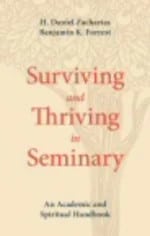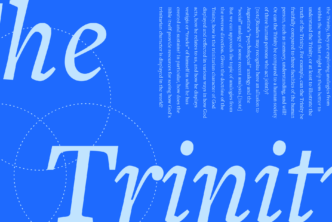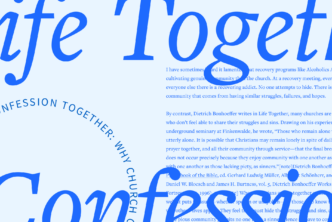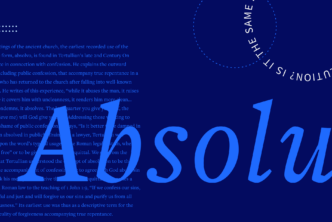Typically when seminary students begin their theological education journey, they anticipate writing lots of papers, listening to long lectures, and digging into new, deep topics they may not have explored before.
They don’t often consider their time spent reading—or that how they read might impact their experience.
“In my first year of post-secondary education at a one-year Bible school,” says Danny Zacharias, “I made the mistake of diving into books the same way I always had. This gave me the same results I always had: I forgot what I read, had no notes, and often had to reread.”

Here are their five excellent tips.
***
1. Read to learn—not for entertainment.
In seminary, you will need to read differently than you do when you read for fun. Some of you already might have learned this in your undergraduate studies, but others of you may find it odd to think that there are different kinds of reading.
When you are studying, you should not be reading the same way you just finished reading your last engrossing novel. You read a novel curled up on your sofa with a blanket and a warm drink. You read it from beginning to end. You are reading for the sheer delight and entertainment of it.
While you (hopefully) will enjoy learning, reading for learning is different from reading for entertainment. It is an active exercise aimed at information extraction. I (Danny) had a teacher once who called all of his books his “friends” that he had conversations with. This analogy has stuck with me. I encourage students to think of their textbook and essay authors as teachers because, after all, they will be teaching you something. And there are a few things about these textual teachers that are even better than live teachers:
- They (usually) stay on topic
- They don’t let others interrupt their train of thought
- You can rewind and fast-forward their discussion. You can pause them, go back to listen one more time to what they said, and even check out the ending first.
As you open up one of these new “teachers,” come with the purpose of understanding their arguments and information—not for entertainment.
2. Evaluate what you read—before you read it.
Because not everything you come across is worth reading, you need to be able to decide whether to spend time with it. For instance, your assigned textbooks should be read thoroughly in the order your professor suggests, because in choosing that textbook, they are telling you that they have chosen this book as a co-teacher for the course.
Reading for an assignment is different though. In these cases, you need to do some quick evaluation to decide whether you should read something, and if so, how deeply you should read it. Whether it is a book or an article, take time to know what it is about; otherwise you will end up wasting time reading it only to learn you shouldn’t have bothered.
Once you have done this, it is time to decide if it is worth reading more. Keeping your topic in mind, decide if:
- It is not worth any more time, because it does not speak to your topic
- It is worth a little more of your time because it is somewhat related to your topic. Decide how much time, and spend this time seeking to understand the broad outline of what the author is trying to convince you of and the points that lead to this conclusion
- It is worth a full front-to-back read. This is a major decision, because reading does take time, and you need to jealously guard your time. If something is right on topic, read the book well. But remember that when you are researching for a paper, there are very few books that are worthy of a full front-to-back read.
3. Read to extract information.
If you’ve decided to read something, don’t curl up on the couch! Sit up while you are reading, and have a pen and paper or your laptop nearby to take notes. You are reading for information, so your job is to extract that information.
Here is a simple tip to increase your reading speed: use a pen or your finger to go back and forth on the page. That pointer forces you to stay at a good pace. Trust us, it works!
If you are not taking notes while reading, you are not doing it right. Notes are a mental system for jogging your memory to remember what you read.
Because most of my (Danny’s) reading is done electronically within Logos Bible Software, I use the highlighting and note-taking options within Logos. I try to minimize the amount of times that I pause while reading—I highlight quickly and press forward. After each chapter, I write out a summary of the chapter and place it in my reference manager. When I am completely done with the book, I review both my summaries, as well as all of my highlights, and make notes on highlighted portions as needed.
The process for a physical book is similar, except that instead of highlighting, I make a simple dot or bracket in the margin with a pencil. Thus, at the end of reading, I conclude by typing out the relevant notes and quotations and then place them in my reference manager.
If this sounds like a lot of work, it is! This is part of our point. Because it is a lot of work, don’t weigh yourself down with reading every word or going back and rereading the last paragraph for the third time. Instead, press on—you’ve got a lot of work ahead of you and you need to get going.
The purpose of taking notes is for you to understand what you are reading and be able to recall it later. In 30 seconds, you should be able to describe the purpose of what you just read. What are the main points, and what conclusion was drawn? For every article, essay, book chapter, and book you read, it may be helpful to write a paragraph summary of it for yourself. If you can do this, you are reading with understanding.
4. Don’t multitask.
Reading requires your attention. That may seem obvious, yet you will be tempted to try to simultaneously watch something on your laptop, listen to music, carry on a texting conversation with a friend, or watch over your children. This won’t work well (and you know it). So don’t fool yourself by saying you are multitasking.
Except for combining a very regular and mundane activity like walking while listening to a podcast, or eating and reading the newspaper, multitasking is a myth.1 All you are actually doing is rapid task-switching. This results in less focus on the tasks at hand and reduces your attention
Instead of interrupting yourself in the guise of multitasking, turn on some music, but make it instrumental. Turn off your messaging service. Turn off your email. And be somewhere where you won’t be interrupted. Devote your attention to what you are actually doing.
5. Read with the goal to grow.
You may have been reading and writing since you were very young, but you are in a whole new world now. You’ll come across words you’ve never seen before, and there will be times when you read a page over and over again because you just aren’t understanding it.
That’s okay.
You are entering into a new field of study, and your professor and the writers you read all went through the same process. These uncomfortable times of growing in your reading and writing skills are like a mental gym. With grit and determination, the process will be a time of growth for you.
***
Put these tips to work and start chipping away at your seminary reading list—and read more articles on improving your researching, reading, and writing skills in the 2021 Logos Bible Software Seminary Guide.
Related articles
- How to Improve Writing Skills and Thrive in Seminary
- Going to Seminary? 3 Mercifully Simple Tips for the Journey
- Your Secret Weapon for Seminary: Research & Exegesis Tools
- Secrets to Using Logos for Class Notes, from a Seminary Grad
- How to Juggle Ministry While Attending Seminary
Related resources
- Introduction to Writing Bundle (3 courses)
- Lexham Press Seminary Essentials Bundle (40 vols.)
- Surviving and Thriving in Seminary: An Academic and Spiritual Handbook by Danny Zacharias; Benjamin K. Forrest






